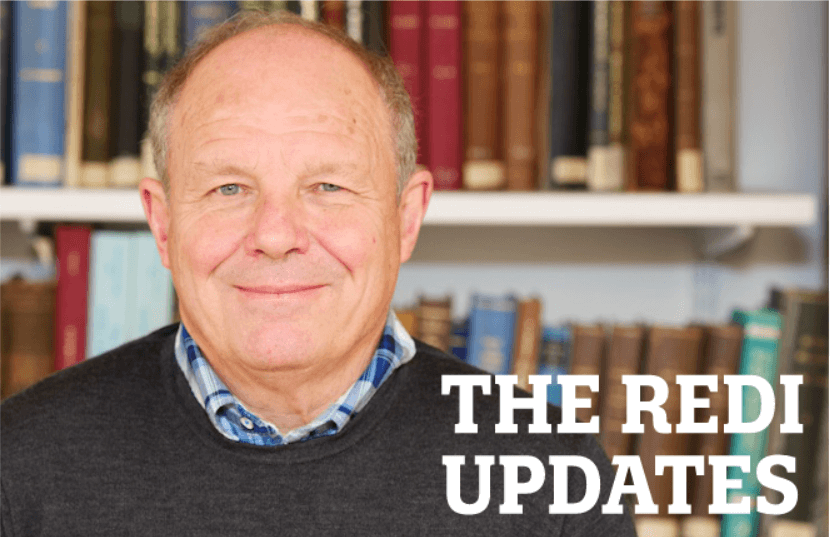Welcome to REDI-Updates. REDI-Updates aims to get behind the data and translate it into understandable terms. In this edition, WMREDI staff look at the government's flagship policy - Levelling Up. We look at the challenge of implementing, understanding and measuring levelling up. In this blog, Professor John Goddard, with Rebecca Riley, Professor Anne Green, Professor Chris Millward, Des McNulty and Mike Boxall discuss the creation of a new policy forum which will examine what role Universities can play in Levelling Up. View REDI-Updates. Find out more about the Policy Forum.
Missing Links in Levelling Up Responses
The regional and local inequalities in social, economic and place-based success that underly the levelling-up agenda are deep-seated and complex and have persisted and even worsened despite numerous policy initiatives over many years. The Levelling Up White Paper (LUWP) recognises these complexities and acknowledges the failings of past interventions. It proposes a range of locally-driven reforms to redress four essential pillars (or statuses) across 12 social and economic missions. One important engine for effective levelling up responses, largely neglected in the White Paper, is active collaboration between universities and civic partners (with others) to understand and address key community needs in their localities.
There is a powerful body of social science research on the contribution of universities to city and regional development but much of the research in this area has not hitherto informed policy and practice, particularly in the UK. This is in part because of silos within central government between those focusing on higher education, research and innovation, and those responsible for ‘place’. Parallel silos of disconnected roles and interests are seen at local levels within and between local government and universities. As a consequence, there has been a generic failure to ensure that the weight of academic knowledge and research has been applied to regeneration policies and practices in the places where universities are located.
One of the largest concentrations of research capacity in this arena is City-REDI/WMREDI. The capabilities, work and impacts of City-REDI/WMREDI are discussed in Box 1. These capabilities will be applied and extended to bridge the gaps in university/civic engagement through a new Universities and Regions Policy Forum, based in City-REDI and providing a national research-informed focus on the roles of university R&D and education in city/regional regeneration.
Box One: The WMREDI/WMCA partnership - Rebecca Riley and Professor Anne Green Research institutes with a strong applied and policy focus are a vital part of an evidence-backed development landscape; they provide crucial evidence for policymakers and bring academic rigour and long-term perspectives in a short-term world. City-REDI was established by the University of Birmingham to develop a better understanding of city-regions as complex, integrated and diverse economic, political and social systems. This mission was extended in 2019 with the establishment of the West Midlands Region Economic Development Institute (WMREDI). The creation of WMREDI coincided with significant economic and social shocks triggered by Brexit and Covid-19, which impacted regions differently, accelerating underlying socio-economic and spatial inequalities. Understanding different scenarios and impacts to provide real-time insights and intelligence for policymakers at regional and national levels is an ongoing priority, notably in partnership with the West Midlands Combined Authority (WMCA). A hybrid structure, combining the interests and expertise of academic researchers and those of data analysts and policy specialists, has been key to advancing understanding of place (in robust, objective, evidence-based terms) as well as being relevant to current policy and practice.

Informing policy understanding and actions
The Universities & Regions Policy Forum will bring together academic researchers with policymakers and practitioners from outside higher education (HE) seeking to enhance their understanding of levelling up challenges and build more effective shared responses to them.
The Forum will have two strands of activity. The first will bring together key decision-makers from across Whitehall, local government, business and the community sector along with researchers and others from HE, meeting under Chatham House conventions to share experiences of engaging universities to help meet regional and place-based levelling up needs. The second will be an open strand in which City-REDI will share research findings relevant to the UK, including insights arising from the WMREDI programme. Each meeting will be co-hosted by a senior City-REDI staff member or associate and a prominent policy-maker appropriate to the topic.
The worlds of higher education research and city-regional policy and practice are each crowded marketplaces with multiple interest groups. The Universities & Regions Policy Forum at Birmingham will provide an opportunity to link these interests for the first time through a shared focus on the necessary political, organisational and systemic changes identified by the Levelling Up White Paper and elsewhere. We envisage the Forum exploring three core issues for realising the ambitions set out in the levelling up White Paper:
- The politics of devolving, distributing and aligning the funding and resources available for place-based levelling up interventions, recognising that there is little new money on offer or in prospect (Box 2)
- The balkanisation of the education and skills environment, between universities and even more so between schools, colleges and other providers, and the need for greater integration across this fragmented landscape (Box 3)
- The need for shared performance and accountability frameworks focused on the impacts of university/civic collaborations on the diversity of mission-related outcomes sought through the levelling up agenda (Box 4)
Box 2: A devolutionist view – Des McNulty The political reaction to the levelling up White Paper, focusing on the lack of new money and the ways in which resources are allocated to different parts of the UK, might lead commentators to overlook its significance. As a flagship policy, it is dependent on the political fortunes of its standard bearers and in particular on the energy and commitment of Michael Gove. The White Paper provides a framework within which targets are set and progress is measured which will inevitably impact across government departments and institutions. The emphasis on place is not entirely new, but the levelling up White Paper is more ambitious, not just in geographical scope but in the extent to which accountability is being transferred to local agencies/partners to tackle difficult and long-standing problems. It may be that the intentions of the White Paper are strangled by departmental rivalries within Whitehall, by the lack of governance structures able to advance the levelling up agenda in many parts of the UK and by silo mentalities and institutional cultures that are resistant to change. But the experience of devolution in England (and in Scotland, Wales and Northern Ireland) is that transfer of accountability to regional or city tiers of government opens up a better informed, more inclusive and generally more constructive policy debate about what is needed to improve economic and social outcomes.
Box 3: An Educationalist View – Professor Chris Millward Strong connections between government and universities will be crucial to improve prosperity and opportunity in communities over coming years. National and local government need robust insights and evidence on the activity conducted by universities, and other learning providers, if their investments and regulatory interventions are to yield the desired results. Universities are also engines of the evidence and expertise needed for successful policy and service delivery across all parts of government. Meeting this need is currently made difficult by the separation of responsibilities for education and skills activity between different parts of government and front line delivery providers. Policies promoting competition and choice in higher education have led to more dynamic and responsive institutions, but have also fostered separation and stratification of learning pathways and institutions. This creates problems for those learners who take non-traditional routes into higher education, such as through further education and work, and also for employers who want to understand which providers are best able to meet their skills needs, and indeed to stimulate partnerships between universities, colleges and schools to address them. Learners from the most disadvantaged communities are more likely than others to study locally and employers need skills training that meets the circumstances of their local workforce. This is where the evidence, evaluation, assessment and accountability elements of the levelling up White Paper could become particularly important, ensuring that disparate areas of policy create complementary incentives and conditions at local levels.
Box 4: A higher education consultant’s view – Mike Boxall There is no doubting the commitment of (almost) all universities to playing more prominent roles at local levels in the 12 social and economic missions identified in the Levelling Up White Paper. A recent survey of UK vice-chancellors showed up to 60% placing aspects of local engagement among their top strategic priorities, while more than 60 institutions have signed up to Civic University Agreements with local partners. But that commitment, and the potential impacts of universities in their localities, seem not to receive similar levels of engagement from national government or regional agencies. There is almost no substantive reference to the role of universities in the White Paper, other than their contributions to national and regional research and development capabilities. With some important exceptions, there has been similar neglect of central roles for universities in other local development plans, such as those from LEPs or mayoral combined authorities. There is clearly a failure of connections here. Bridging these missed connections will be crucial for universities to translate their civic ambitions into substantive partnerships, and for civic partners to benefit from the contributions and benefits that universities can offer. Central to this goal is a need for frameworks of shared purposes and shared accountabilities for multi-player civic collaborations. The collaborative work of developing and agreeing such performance frameworks, applicable at the micro level of specific local needs, can provide a powerful vehicle for outcome- and impacts-focused dialogues between universities and their potential partners.

Shaping the debate
Deep-seated change in lagging places requires linking up all four of the pillars identified in the White Paper: boosting productivity, pay, jobs and living standards; spreading local opportunities and improving public services; restoring a sense of community, local pride and belonging; and empowering local leaders to develop local change and delivery systems. The fact that the Government is trying to put in place a performance management and mission-based approach to how the available resources are deployed could represent a significant shift in the roles of universities in place-based levelling up. But the extent of this shift will depend on how rigorously the Government pursues it and is willing to direct some share of current funding to support university contributions to levelling up strategies. Regulatory and funding regimes, such as the Teaching Evaluation and Knowledge Exchange Frameworks, must recognise what universities can do for their places and specifically how they can contribute most effectively to the levelling up missions. The research, evidence and debate generated by the Universities & Regions Policy Forum can be an important catalyst for achieving this.
View our Levelling Up research
This blog was written by Professor John Goddard, City-REDI / WMREDI, University of Birmingham.
This article was written for the Global Government Forum.
Disclaimer:
The views expressed in this analysis post are those of the authors and not necessarily those of City-REDI, WMREDI or the University of Birmingham.
